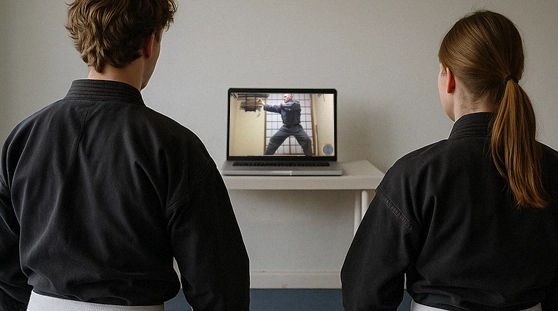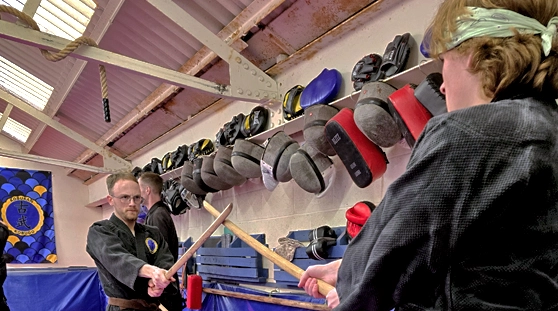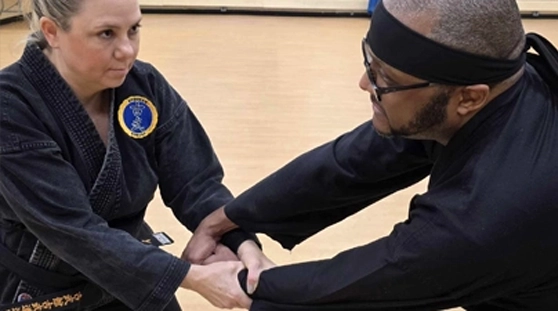Your Pathway to Teaching Jujutsu & Ninpo
Become a Kobukan Instructor
Start as a study group, grow into a training group, or establish your own dojo — the Kobukan offers three clear paths to instructing.
Which Instructor Path Is Right for You?
STUDY GROUP

While a Study Group isn’t necessarily part of the official instructor path, it can grow into a recognized Kobukan Training Group with consistent commitment. Study Groups are enthusiasts who support each other by training together in the fundamentals of Kobukan Shokyu Taijutsu.
KOBUKAN TRAINING GROUP

A Kobukan Training Group is led by an instructor that is actively working towards a black belt rank, and has certified to teach Shokyu and/or Chukyu. With access to the full Kyu curriculum, Training Groups provide structured practice, student development, and a path to becoming a recognized Kobukan Dojo.
KOBUKAN DOJO

A Kobukan Dojo is a fully recognized school led by a certified instructor. Dojo have the authority to test students, offer the complete Kobukan curriculum, and serve as permanent hubs for Jujutsu and Ninpo in their communities. Instructors are authorized to test students to one level below their rank.
Kobukan Training Groups
OVERVIEW
You don’t need a full dojo or decades of experience to begin sharing authentic Japanese martial arts. Kobukan Training Groups empower dedicated practitioners to lead small classes or private sessions — all while receiving structured support, curriculum access, and mentorship from our global network.
Whether you’re teaching in a fully functioning martial arts school, community center, a rented space, or even your own backyard, you’ll be part of a respected lineage that values clarity, tradition, and personal growth.
This is your opportunity to grow as a martial artist, guide others, and represent the Kobukan with integrity.
Kobukan Training Groups are the foundation of our global growth.
They provide motivated martial artists the opportunity to share authentic Japanese Jujutsu and Ninpo with their local community — even without a full-time dojo. These groups often begin in modest settings such as community centers, parks, garages, or shared spaces, but their impact is no less meaningful.
Training Groups represent the spirit of Kobukan: small, disciplined, and deeply rooted in tradition, while offering the flexibility to adapt to modern realities. They allow serious practitioners to grow as leaders, give back to their community, and stay connected to a living martial lineage.
To lead a Kobukan Training Group, you must demonstrate strong personal character, technical ability, and alignment with the principles of the Kobukan organization.
- Group Leaders are Kyu (non-black belt) students that have successfully passed Shokyu (9th – 7th Kyu), have a passion for learning martial arts, as well as sharing it with others.
- Leaders are expected to actively train, maintain communication with their area leader (Shibu-cho), and follow the Kobukan curriculum with fidelity.
Kobukan Training Groups can vary in size and setting — some are private, while others meet publicly several times a week. Regardless of size, all groups must:
- Follow the official kyu-level curriculum
- Maintain active organizational enrollment with students learning the Kobukan system
- Work with their Shibu-cho to ensure student testings are maintaining a high standard
- Maintain an appropriate, respectful, and clean training environment
- Participate in organization-wide communication, events, and updates
Groups are not required to operate full-time or in commercial spaces, but they are expected to uphold the standards and spirit of Kobukan in all activities.
What is a Kobukan Training Group?
A Training Group is an officially recognized gathering of students led by a qualified Kobukan practitioner of at least 7th kyu. These groups are typically smaller than dojo, and can be held in a variety of settings — from garages to public halls. The group follows the official curriculum and offers legitimate rank advancement under Kobukan guidance.
Do I need a dojo to start a group?
No. You can begin in any safe, appropriate, and clean space. Many groups start small and grow organically, eventually transitioning to a full dojo after successfully achieving shodan (black belt). The most important thing is to have a passion for martial arts and uphold Kobukan standards and values.
When do Training Groups become a full dojo?
A Group Leader becomes a “Dojo-cho”, or Dojo Leader, upons successfully passing their black belt exam. As a Dojo-cho, the instructor has more autonomy to conduct tests up to one level below there’s, and register it with the Kobukan organization. The title of the leader also becomes “Sensei”.
Kobukan Dojo
OVERVIEW
For those who have successfully tested to at least shodan (1st-degree black belt), Kobukan offers the opportunity to establish an official affiliated dojo — aligning your school with a respected Japanese lineage while preserving the unique spirit of your local program.
As a recognized Kobukan Dojo, you become a vital part of both your local community and our international organization — contributing to the preservation and transmission of authentic Japanese Jujutsu and Ninpo.
Whether you operate a full-time facility or a smaller part-time program, Kobukan affiliation provides the structure, clarity, and legitimacy that serious martial artists seek in today’s world.
Kobukan Dojo-cho are the pillars of our global Kobukan community.
Affiliated Kobukan Dojo preserve and transmit authentic Japanese Jujutsu and Ninpo through a structured, legitimate, and lineage-connected system. Dojo serve as hubs for high-quality instruction, personal growth, and community engagement — grounded in tradition but responsive to modern training environments.
By becoming part of the Kobukan network, your dojo contributes to the global effort to maintain the technical, cultural, and ethical standards of our art. Affiliated dojo are not only training centers — they are pillars of leadership within the organization, entrusted with guiding students and shaping the next generation of martial artists.
To establish a licensed Kobukan Dojo, the lead instructor must hold a minimum rank of shodan (1st-degree black belt) within the Kobukan system or be formally accepted through recognized transition from another traditional art.
Instructors must demonstrate a deep understanding of the curriculum, the ability to teach with clarity and integrity, and a commitment to ongoing personal training. Alignment with the values and standards of the Kobukan organization is essential, as dojo leaders serve as representatives of both the art and its community.
Instructors are expected to remain active in the organization through communication, seminars, continuing education, and rank evaluations for both themselves and their students.
Kobukan Dojo may operate in commercial facilities, community centers, or dedicated spaces of any size, provided they offer a safe, clean, and respectful training environment. There is no minimum student count required, but dojo leaders are expected to maintain consistent classes, be willing to accept new students, and uphold the integrity of the training experience.
Each dojo must follow the official curriculum for rank progression, maintain records of student evaluations, and issue ranks through proper organizational channels. Dojo are listed on the Kobukan website and are encouraged to participate in regional and international seminars.
Licensed dojo may host in-person events with their students, test students, and contribute to the growth of the organization while maintaining their own local identity and culture.
Can I run a Kobukan Dojo part-time?
Yes. Many Kobukan Dojo operate part-time or in multi-use facilities. As long as you meet the instructional and curriculum standards, the size or schedule of your dojo does not affect your eligibility.
Do I need to use the Kobukan name for my dojo?
No. While some schools choose to brand fully under the Kobukan name, others maintain their own school identity while identifying as a Kobukan-affiliated dojo. Your school’s name can remain independent, provided it does not conflict with the values or structure of the organization. Use of “Kobukan” in a school name is either “Kobukan – (City), (State/Province)” or “Kobukan (Japanese Dojo Name) Dojo”.
As mentioned, instructors maintain independent in naming their school as long as it isn’t misaligned with our core values or uses “Kobukan” outside of the structure mentioned above.
Can I test my students for rank?
Yes. As a recognized dojo leader, you may test your students for kyu ranks in accordance with Kobukan standards, up to one rank below yours. Rank approval processes and guidelines are provided upon affiliation. For black belt ranks and above, additional oversight and coordination with Honbu Dojo (headquarters) is required.
Do my students need to join the Kobukan?
Yes. Any student participating in your Kobukan training is expected to maintain an active membership with the organization, regardless of if it is a Training Group or Dojo. You are welcome to extend a trial period up to 1-month to allow potential students participate in training. This allows us to ensure standards are being met and students are able to benefit from our global Kobukan community and support.
Other Frequently Asked Questions
How does the Kobukan compare to other x-kan?
The Kobukan Kobudo Renmei holds deep respect for all who work to preserve and pass down traditional Japanese martial arts, regardless of affiliation. Many of our instructors come from other x-kan organizations and bring valuable experience. That said, we believe it’s important to clearly define not only what we are — but also what we are not.
Training:
The Kobukan is a martial arts organization first and foremost — dedicated to preserving the Takamatsu-den arts as they were meant to be transmitted: technically accurate, combatively relevant, and historically honest. We aim to provide transparency around what is original versus what has been modernized or modified — so students know exactly what they’re learning, and why.
Culture:
We are traditional in structure, but modern in mindset. Kobukan promotes a respectful, community-driven environment where students and instructors alike support one another’s growth. While we maintain a clear instructional hierarchy — including Kancho, Shibu-cho, and certified instructors — that structure exists to support growth, not control it. We are not a mystical group, nor are we interested in being a “ninja reenactment” organization. Our focus is on practical skill, personal discipline, and sincere martial study.
Standards:
We maintain clear standards across all ranks and training groups. Advancement is earned through consistent effort, technical ability, and character — not simply time served or personal favoritism. Our goal is to give both students and instructors a clear, honest, and challenging path forward rooted in legitimacy and substance.
Can I get credit for previous martial arts training?
In most cases, yes. While martial arts organizations — especially within Jujutsu and Ninpo — often vary in their technical standards and promotion criteria, we make every effort to acknowledge valid prior experience whenever possible.
That said, rank alone doesn’t always reflect skill level. At Kobukan, all practitioners are evaluated based on technical ability, understanding, and character. Those with prior experience typically progress more quickly and are never treated as if they’re “starting over” — rather, we support them in rising to their natural level of proficiency.
For incoming instructors, we offer a Transfer Path, which allows entry into the organization at an appropriate rank. The process varies depending on the situation:
- If one of our Dojo-cho personally knows the instructor’s background and can vouch for their technical skill and alignment with Kobukan values, the process may be as simple as a transfer certificate from Honbu Dojo. The instructor will then be expected to learn the Kobukan kyu-level system within the following year.
- In cases where direct familiarity isn’t present, the instructor may submit a video demonstration of their technique and movement for review by Kancho. If the alignment is strong, a provisional rank may be granted, along with the same expectation: full familiarity with the Kobukan curriculum within one year, and complete transparency with students regarding their journey and transition.
This approach allows us to welcome experienced martial artists while maintaining the clarity and integrity of our system.
Can I teach other martial arts styles alongside Kobukan?
Absolutely. Many of our instructors have backgrounds in multiple martial arts and continue to teach complementary styles such as Brazilian Jiu-Jitsu, Karate, Krav Maga, or modern self-defense systems. We welcome and respect diverse martial experience.
That said, to preserve the clarity and integrity of our curriculum and internal culture, instructors may not simultaneously offer training in other Ninpo or x-kan systems alongside Kobukan material. This ensures students receive consistent instruction rooted in our specific approach — free from overlapping terminology, mixed methodologies, or conflicting rank structures.
If you currently teach a ninpo-based system and are considering a transition to Kobukan, we’d be happy to discuss how that process can unfold respectfully and transparently.
Is travel required for advancement?
It depends. With a dedicated training partner, a motivated student can make meaningful progress through the kyu-level curriculum using Kobukan University and regular support from a Shibu-cho. That said, training exclusively online may limit your access to the full depth of support, feedback, and camaraderie that comes from in-person interaction with other members.
For students, remote training is often sustainable with the right structure and commitment. However, instructors are expected to represent Kobukan’s standards, technical accuracy, and culture — which does require some level of in-person participation. This may include attending regional seminars, instructor development events, or Taikai.
The best approach is to speak directly with your Shibu-cho about your goals and training circumstances. They can help set realistic expectations and guide you toward the best path forward.
How do I get started?
We’re excited that you’re considering joining the Kobukan instructor community. Whether you’re applying to lead a Training Group or establish an affiliated Dojo, the first step is to complete the instructor application form on this page.
Be sure to indicate which Shibu you fall under, as your application will be sent directly to that Shibu-cho for review. Once received, the Shibu-cho will follow up with you to learn more about your background, goals, and how we can best support your journey.
